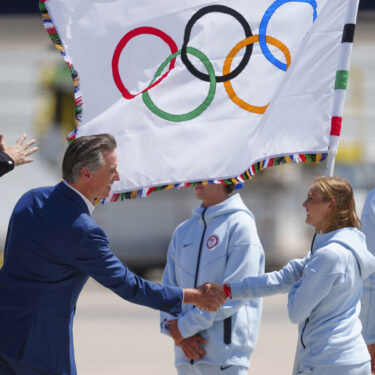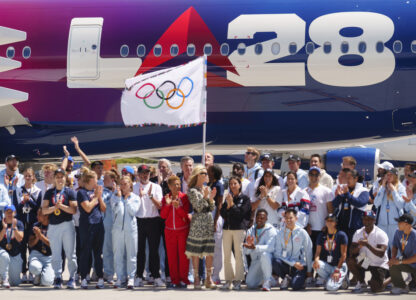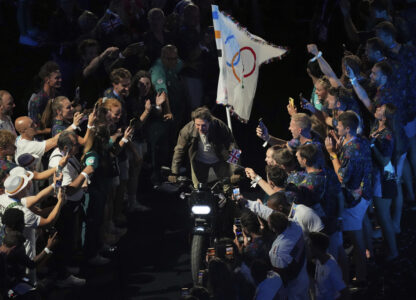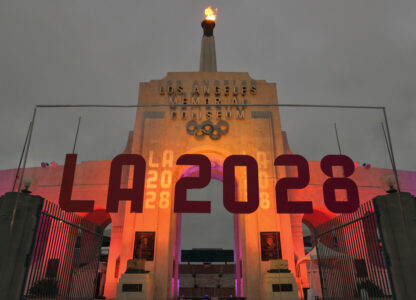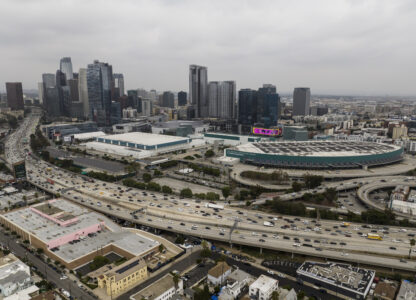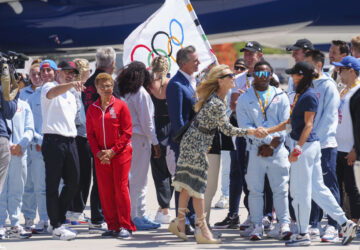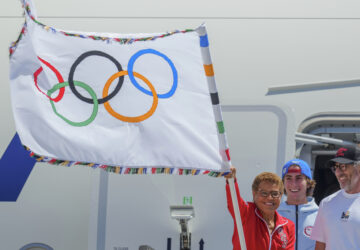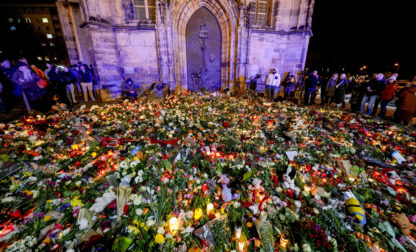LOS ANGELES (AP) — It’s Los Angeles’ turn for the torch. Mayor Karen Bass accepted the Olympic flag at the Paris closing ceremony Sunday, before handing it off to a key representative of LA’s local business — Tom Cruise — who in a pre-recorded trek via motorcycle, plane and parachute kicked off the countdown to 2028.
The city will become the third in the world to host the games three times as it adds to the storied years of 1932 and 1984. Here’s a look forward and back in time at the Olympics in LA.
LA’s Olympic trilogy
Los Angeles got the 2028 games as a consolation prize when Paris was picked for 2024.
Back in 1932, LA hosted its first Olympics. The city was the only bidder for the games at a time marred by the Great Depression and the absence of several nations. Yet memorable sport moments came from athletes including American athlete Babe Didrikson Zaharias, who won golds in the new women’s events of javelin and hurdles.
Financial and cultural success gave 1984 a reputation as the “good” Olympics” which made seemingly every major world city want their own.
Emphasizing both the modern and the classical with a hand from Hollywood, the games opened with decathlon champion Rafer Johnson lighting the torch, a guy in a jetpack descending into the Memorial Coliseum and theme music by “Star Wars” maestro John Williams.
With Eastern Bloc countries boycotting, the U.S. dominated. Carl Lewis and Mary Lou Retton are among the athletes who became household names. A young Michael Jordan led the men’s basketball team to gold.
The games renewed, for a while, the global reputation of a city that had been perceived to be in decline.
“We want our games to be a modern games, youthful, full of the optimism that Southern California brings to the world and the globe,” Janet Evans, four-time Olympic gold medalist in swimming and chief athlete officer for the LA 2028 organizing committee, told The Associated Press in Paris.
Passing the torch
Bass, who returned to LA Monday, said one of the biggest takeaways was the way Paris organizers made the “Olympics for everyone, whether you participated in the games or not.”
She gave examples of watch parties held in surrounding cities and breakdancing classes before the competitions.
Joining her were LA28 Chairperson Casey Wasserman, an entertainment executive, and LA councilmember Traci Park, chair of the city Olympic committee.
City council president Paul Krekorian, who joined Bass in bringing the Olympic flag to LA, said they were “going to make this the only city in the world who have ever had three financially successful Olympic Games.”
Venues old and new, plus a swimming stadium
Amid a stadium-and-arena boom, LA will polish existing structures rather than erect new ones.
“It’s a no-build games,” Evans said.
After Paris’ innovative opening ceremony on the Seine River, LA plans to open with a traditional, stadium-based approach at SoFi Stadium in neighboring Inglewood that also incorporates the century-old Memorial Coliseum in Los Angeles itself.
Home to two NFL teams, SoFi has hosted a Super Bowl and several Taylor Swift concerts since opening in 2020. It will become what organizers say is the largest Olympic swimming venue ever. Its opening ceremony role means swimming will come after track and field for the first time since 1972.
Intuit Dome, the soon-to-open Inglewood home of the NBA’s Clippers, would be the games’ newest major venue and is the planned home for Olympic basketball. The Lakers’ downtown Crypto.com Arena will host gymnastics.
The toxicity of swimming in the Seine became a serious issue in Paris. That could put renewed focus on the Long Beach area waterfront when it hosts marathon swimming and triathlon races. Its cleanliness history is mixed but its ocean waters got consistently high marks in a 2023 analysis by nonprofit Heal the Bay.
The Long Beach shore was home to the pre-recorded performances during Sunday’s ceremony of the Red Hot Chili Peppers, Billie Eilish, Snoop Dogg and Dr. Dre, though it was easy to mistake for LA’s Venice Beach, where the journey of the flag begun by Cruise was shown ending moments earlier.
Trains, buses and traffic
A city that’s notoriously hard to traverse may seem like an odd fit for the Olympics, but it can work.
Bass said she plans to emulate the tactics of Tom Bradley, the mayor in 1984, whose traffic mitigations had some saying it was better than at non-Olympic times. They include asking local businesses to stagger workforce hours to reduce the number of cars on the road and allow work from home during the 17-day games.
Landing the Olympics under then-Mayor Eric Garcetti in 2017 gave the city an unusually long lead time for planning.
While it’s no Paris Metro, LA has built a subway since its last Olympics, with lines running past major venues.
In 2018, the city planned an ambitious slate of 28 bus and rail projects to transform public transit. Some were scrapped but others moved forward, including the extension of a subway line to connect downtown Los Angeles with UCLA, the planned home of the Olympic Village.
Another high-profile project is the Inglewood People Mover, an automated, three-stop rail line past major Olympic venues. It initially received a commitment of $1 billion in federal funding, but opposition from Democratic Rep. Maxine Waters led to a $200 million reduction, the Los Angeles Times reported. It’s unclear whether the line will be completed by 2028.
Metro recently received $900 million in funding through an infrastructure spending package and grants from the Biden administration, of which $139 million will go directly toward improving transportation by 2028 and the goal of a “car-free” Olympics.
“The biggest challenge is not waiting to 2028, but really taking the opportunity between now and 2028 to help Angelenos and visitors alike reimagine the transportation network as something that will be their first choice,” Metro CEO Stephanie Wiggins said.
Crime, safety and perception
While crime rates were considerably higher in 1984 than today, the countdown to 2028 comes as the issue has gotten increased attention and cast a social-media-amplified shadow.
The Olympics are designated as a national special security event, which makes the U.S. Secret Service the lead agency tasked with developing a security plan, supported by significant federal resources.
LA city and county law enforcement sent officers to Paris to observe, learn and assist as they prepare for their own 2028 games.
There are many more encampments on city streets than there were in 1984, and it’s unlikely LA will have solved its homeless crisis in the next four years. As the Paris games ended, California Gov. Gavin Newsom threatened to withhold funding from cities unable to clear encampments.
Ahead of the Games in Paris, organizers relocated thousands of unhoused people, a practice also used for the 2016 Rio de Janiero games and criticized by activists as “social cleansing.”
Tourists and finances
LA is the “next logical destination” for the Olympics, said Adam Burke, president and CEO of the LA Tourism and Convention Board. “LA has emerged as really one of the world’s sports capitals.”
First though, the city will host a FIFA World Cup event and U.S. Women’s Open in 2026 and another Super Bowl in 2027.
The city’s hotel industry has continued to see growth, adding 9,000 new hotel rooms in the past four years with more to come over the next four.
LA28 organizers are banking on ticket sales, sponsorships, payments from the International Olympic Committee and other revenue streams to cover the games’ $6.9 billion budget. The committee has brought in just over $1 billion toward a goal of $2.5 billion in domestic corporate sponsorships.
___
Associated Press Writer Noreen Nassir contributed from Paris.

